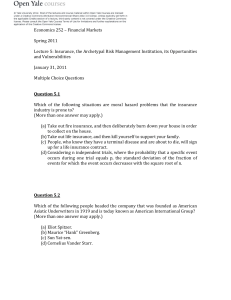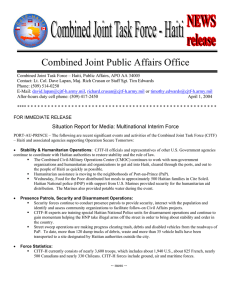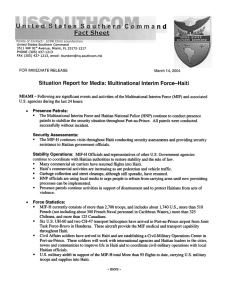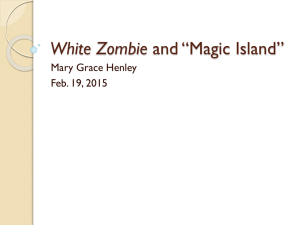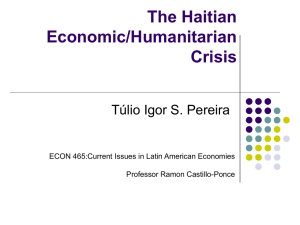21A.460 April 26, 2005 Of Men and Gods
advertisement
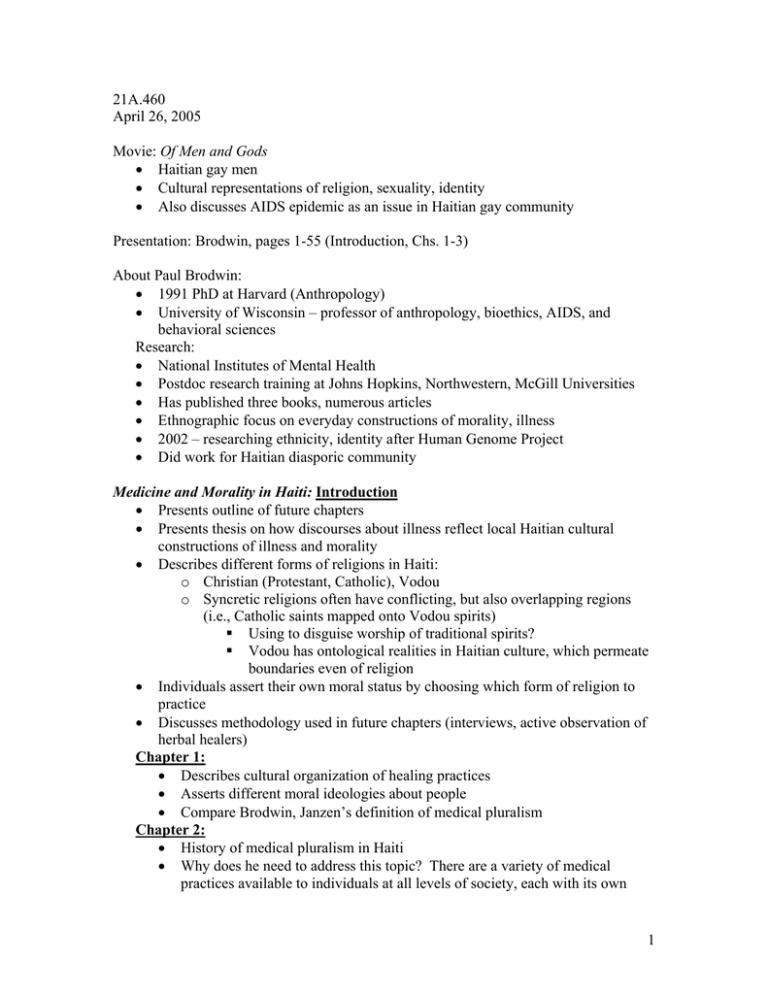
21A.460 April 26, 2005 Movie: Of Men and Gods • Haitian gay men • Cultural representations of religion, sexuality, identity • Also discusses AIDS epidemic as an issue in Haitian gay community Presentation: Brodwin, pages 1-55 (Introduction, Chs. 1-3) About Paul Brodwin: • 1991 PhD at Harvard (Anthropology) • University of Wisconsin – professor of anthropology, bioethics, AIDS, and behavioral sciences Research: • National Institutes of Mental Health • Postdoc research training at Johns Hopkins, Northwestern, McGill Universities • Has published three books, numerous articles • Ethnographic focus on everyday constructions of morality, illness • 2002 – researching ethnicity, identity after Human Genome Project • Did work for Haitian diasporic community Medicine and Morality in Haiti: Introduction • Presents outline of future chapters • Presents thesis on how discourses about illness reflect local Haitian cultural constructions of illness and morality • Describes different forms of religions in Haiti: o Christian (Protestant, Catholic), Vodou o Syncretic religions often have conflicting, but also overlapping regions (i.e., Catholic saints mapped onto Vodou spirits) Using to disguise worship of traditional spirits? Vodou has ontological realities in Haitian culture, which permeate boundaries even of religion • Individuals assert their own moral status by choosing which form of religion to practice • Discusses methodology used in future chapters (interviews, active observation of herbal healers) Chapter 1: • Describes cultural organization of healing practices • Asserts different moral ideologies about people • Compare Brodwin, Janzen’s definition of medical pluralism Chapter 2: • History of medical pluralism in Haiti • Why does he need to address this topic? There are a variety of medical practices available to individuals at all levels of society, each with its own 1 • • • • • • • particular history and cultural significance, which must be understood to fully grasp the Haitian constructions of illness and biomedicine, esp. as it relates to issues of morality Biomedical treatments are often the first-line treatments individuals seek when ill. o If biomedical treatments fail, this indicates that the illness was caused by “unnatural” causes, calling the moral status of the individual into question 1697 – Haiti under imperial control as a colony of France Social system divided into plantation owners → military → petit blancs → slaves (in order of power) Slaves were valuable economic commodities for their owners since their labor was needed to drive the plantation economy. Hence, the health of the slaves was a prime concern for plantation owners, since productivity depends largely on physical health o Much investment was put in to provide adequate care for slaves o Plantation owners primarily used biomedicine and biomedical structures to treat slaves – this is how biomedicine was first introduced to the black Haitian community o In the first years of the colony, traditional African healing practices initially allowed and encouraged; however, as slave numbers gradually increased, slave medicine was eventually repressed due to fears that knowledge of herbs and poisons could enable slaves to poison their masters and lead to uprisings and rebellions o Interesting to compare how different modes of healing are viewed by people in power. How and why does opinion change, from being encouraged to being demonized? o Slave medicine: from owners’ point of view the line between healing and threat are thin. Overarching fear of poisoning and rebellion shaped their perceptions of slave healing practices o However, the lack of slave medicine available after ban was not matched by any subsequent increase in access to biomedical services Colony years ended with Haitian Independence in 1804 1804-1820 – civil war between Pétion and Christophe (leaders of factions in North and South). o Pétion won, but maintained status quo left over from previous colonial regime. o Medical staff and services integrated into military o Expanded medical services for the military and elites, but did not change the lack of access by lower classes o Mulatto elite emerged, and restructuring of land ownership policies led to emergence of a peasant class resembling feudal system American occupation was particularly paternalistic o Dominant theme was that it was “a project” for America to “improve” Haiti 2 • • • o Did not install democratic institutions, so after America left the system virtually collapsed o However, the widespread use and popularity of biomedicine introduced by America remained within Haitian society after they left Part of the reason why Brodwin looks at biomedicine is that he is simultaneously looking at politics of repression In choosing among various modalities, historical as well as local contexts help shape his observations Fieldwork done during a period of crisis in Haiti o Uncertain if it was a conscious choice to not focus on the political but rather only on healing modalities in Haitian culture – is there something missing from his account that could have had an influence on what he has recorded (i.e., could there have been a historical occurrence that could have influenced respondents’ opinions on various subjects?) Movie: Of Men and Gods • Homosexuality is a characteristic that a person is born with (it is not ‘made’ by any social causes) • Perception that Haiti is not tolerant – that other countries such as the United States and Panama are far more willing to accept differences like homosexuality o United States, Panama seen as willing to accept people “as they are” • Term for homosexuality: masisi • Gay men feel like they are truly women • Being with a masisi does not make a man a masisi necessarily • Grande Erzuli (spirit, goddess, female loa) is seen as the being who makes certain people masisi • Emphasized that being a masisi is not God’s fault – it is the result of Erzuli “calling them.” • Due to Vodou codes of family behavior, family members of masisi have to accept him, otherwise would die • It is the loas who decide to make certain people homosexual o Loas seen as ‘spoiling’ people, ruining them in a way o Masisi is seen as ‘going bad,’ but due to a loa • However, there is another opinion that the loas have nothing to do with homosexuality – people are “born that way,” or are being punished for refusing initiation to serve a loa (in this sense, it is considered blasphemous for saying loas were involved) • Homosexuality is a taboo, which is somewhat ameliorated by claiming divine source (Erzuli sent it or made them that way, so therefore there is an element of religious significance that eases the social repercussions) • Becoming a Vodou priest (houngan) eliminates social taboo of being a masisi, allows them to have power and status within society. • In an actual Vodou ceremony, a loa can enter anyone, regardless of gender. Person takes on the gender of the loa. For example, a woman could become 3 • • possessed by a male loa, causing her to display masculine behavior (like be attracted to other women) and essentially being a man for the duration of her possession. Likewise, a female loa could possess a man and cause him to become like a woman, including being attracted to other men Doing unusual things is seen as a sign of possession by the loa. In this context, homosexuality is seen as an aberrant behavior that could be due to possession by the loas, again easing the strict taboo. After God, it is the loas with the power to influence people. In this case, Vodou, or serving the loas is a way to manipulate the situation and gain social standing. 4 MIT OpenCourseWare http://ocw.mit.edu 21A.460J / WGS.620J Medicine, Religion and Politics in Africa and the African Diaspora Spring 2005 For information about citing these materials or our Terms of Use, visit: http://ocw.mit.edu/terms.
